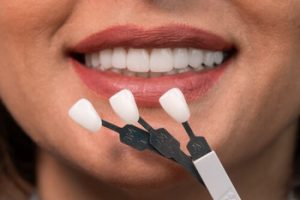When restoring a confident smile and functional bite, the debate over veneers vs. dentures becomes a hot topic. Both effectively solve various dental issues but cater to different needs and conditions.
This comprehensive guide delves into the nuances of veneers and dentures, exploring when each is recommended, why veneers offer superior comfort, and what to expect from the veneer procedure.
Veneers Vs. Dentures: Which Is Better
Choosing between veneers and dentures involves considering various factors, including the extent of tooth damage, aesthetic goals, and oral health. Understanding the fundamental differences between these two dental solutions is crucial for making an informed decision.
Veneers Vs. Dentures: Overview
 Veneers are very thin shells, usually composed of porcelain or composite resin, covering the teeth’s front surface. Their main applications are cosmetic, such as whitening discoloured, cracked, or crooked teeth.
Veneers are very thin shells, usually composed of porcelain or composite resin, covering the teeth’s front surface. Their main applications are cosmetic, such as whitening discoloured, cracked, or crooked teeth.
Porcelain and composite veneers offer a minimally invasive approach to enhancing your smile. They require only a small amount of enamel removal for placement.
Being removable prosthetic devices, dentures replace missing teeth and surrounding tissues. These replacement teeth come in two basic varieties: complete dentures, which replace every tooth in the upper or lower arch or both, and partial dentures, which replace a portion of the missing teeth.
Dentures are effective for individuals with extensive tooth loss or those seeking a more economical option for restoring their smile.
Differences Between Veneers And Dentures
While veneers and dentures are false teeth, they differ significantly in purpose, design, and application.
- Functionality: Veneers focus primarily on enhancing the appearance of existing teeth, addressing cosmetic concerns such as discolouration, chips, or gaps. Conversely, dentures are designed to replace missing teeth entirely, restoring functionality for eating, speaking, and maintaining facial structure.
- Custom Fit: Veneers are meticulously crafted to fit each patient’s unique dental anatomy, ensuring a snug and comfortable fit. On the flip side, dentures may loosen.
- Minimal Alteration Of Natural Teeth: Unlike dentures, which may require significant alterations to the underlying gum tissue and jaw bone, veneers typically involve minimal alteration of natural tooth enamel. This means your natural teeth remain largely intact, preserving their strength and structural integrity while providing a comfortable veneer foundation.
- Smooth Texture And Natural Feel: Porcelain veneers closely mimic the texture and appearance of natural tooth enamel, offering a smooth and natural-feeling surface that blends seamlessly with your existing teeth. Unlike traditional dentures, which may feel bulky or uncomfortable in the mouth, veneers provide a lightweight, comfortable solution that feels like your teeth.
- Stability And Durability: Once securely bonded to the tooth surface, veneers become a permanent part of your smile, offering stability and durability comparable to natural teeth. Unlike removable dentures, which may shift or move while eating or speaking, veneers provide a secure and stable foundation for normal chewing and speaking without discomfort.
- Minimal Maintenance Required: Veneers require minimal maintenance compared to dentures, which may need to be removed and cleaned daily. With veneers, you can maintain your oral hygiene routine of brushing and flossing as usual without needing special cleaning solutions or adhesives.
- Long-Lasting Results: Veneers can endure for many years with the right upkeep and care, offering enduring comfort and cosmetic improvement. Veneers provide a long-lasting and permanent option for obtaining a gorgeous and pleasant smile, unlike dentures, which may need to be changed every few years due to wear and tear.
When To Know You Need Veneers
Determining whether veneers are the right solution for your dental concerns involves considering various aesthetics, functionality, and oral health factors.
Here are some signs that indicate you may benefit from veneers:
Cosmetic Imperfections
If you’re unhappy with the appearance of your smile due to issues such as discolouration, chips, cracks, or misalignment, veneers can offer a transformative solution. These thin shells are custom-designed to cover imperfections and create a more aligned, aesthetically pleasing smile.
Minor Structural Defects
Veneers can also address minor structural defects in your teeth, such as small gaps, uneven edges, or irregular shapes. By concealing these imperfections, veneers can improve your smile’s symmetry and balance.
Staining Or Discolouration
Stubborn stains or discolouration that do not respond to traditional whitening methods may indicate a need for veneers. Unlike surface-whitening treatments, veneers provide a long-lasting solution for achieving a brighter, more radiant smile.
Worn Or Eroded Enamel
If your tooth enamel has become worn down or eroded due to factors such as ageing, acidic foods, or teeth grinding, veneers can provide a protective barrier to prevent further damage and restore the appearance of your teeth.
Desire For A Permanent Solution
Unlike temporary cosmetic treatments such as bonding or whitening, veneers offer a permanent solution for enhancing the appearance of your smile. If properly cared for, veneers can give you confidence in your smile and long-lasting benefits for many years.
Consultation With Your Dentist
Ultimately, the decision to pursue veneers should be made in consultation with your dentist. Your dentist will inspect your teeth in detail, discuss your aesthetic objectives, and decide if veneers are the best course of action for you to achieve the results you want.
By considering these factors and consulting with your dentist, you can determine whether veneers are the right solution for enhancing the beauty and functionality of your smile.
Whether seeking to correct minor imperfections or achieve a complete smile makeover, veneers offer a versatile and effective solution for achieving the smile of your dreams.
The Veneer Procedure: What To Expect
The veneer procedure is a multi-step process that involves careful planning, preparation, and precise execution to achieve optimal results.
Here’s a detailed overview of what to expect during each stage of the veneer procedure:
Initial Consultation
The first step in the veneer procedure is a comprehensive consultation with your dentist. You’ll discuss your cosmetic goals, oral health history, and concerns during this appointment.
Your dental expert will evaluate your gums and teeth to decide if composite or porcelain veneers are the best choice.
Treatment Planning
If you proceed with veneers, your dentist will develop a personalised treatment plan based on your specific needs and goals.
This may involve taking photographs, impressions, and tooth measurements to ensure precise customisation of your veneers.
Preparation
Your dentist will prepare your teeth by polishing off a thin enamel layer before applying the veneers. This ensures a tight fit and helps make room for the veneers.
Local anaesthesia may sometimes be used to minimise discomfort during this process.
Impressions And Customisation
Your dentist will take impressions of your natural teeth once they are prepped to make bespoke veneers that are the exact size, shape, and colour you want.
Your veneers are expertly and meticulously crafted by trained professionals in a dental facility using these impressions.
Temporary Veneers (If Required)
While you wait for your permanent veneers to be crafted, your dentist may provide temporary veneers to protect your prepared teeth and maintain their aesthetics.
When your permanent veneers are complete, you may easily remove these interim restorations, usually constructed of composite resin.
Placement And Bonding
Once your custom veneers are ready, your dentist will carefully place them on your teeth, ensuring a perfect fit and alignment. The veneers are then permanently bonded to the tooth surface using an advanced adhesive, creating a strong and durable bond.
Final Adjustments
Your dentist will make any required corrections to provide the best possible comfort and appearance when the veneers are cemented in place. The veneers may need to be polished or trimmed to have the correct form and texture. Additionally, your dentist will examine your bite to ensure it functions and is aligned properly.
Follow-Up Care
 Once your veneers are in place, your dentist will provide instructions on properly caring for them. To preserve their lifespan and your general oral health, your dentist may suggest good oral hygiene habits and routine dental check-ups.
Once your veneers are in place, your dentist will provide instructions on properly caring for them. To preserve their lifespan and your general oral health, your dentist may suggest good oral hygiene habits and routine dental check-ups.
Knowing what to expect and each phase of the veneer technique will help you feel prepared and confident as you start getting a brighter and more attractive smile.
With your dentist’s expertise and the precision of modern dental technology, veneers offer a safe, effective, and long-lasting solution for achieving the smile of your dreams.
Frequently Asked Questions
How do I know if I need veneers or dentures?
The decision between veneers and dentures depends on your specific dental issues. If you have minor cosmetic concerns or structural defects with your teeth, veneers may be the appropriate choice. On the other hand, dentures may be recommended to restore function and aesthetics if you’re missing multiple teeth or experiencing significant gum disease.
Are veneers permanent?
Even though veneers are considered permanent dental restorations, typical wear and tear or damage may eventually require replacement. However, with the right upkeep and care, they may survive for many years and produce long-lasting effects.
Can I eat and speak normally with veneers?
Yes, veneers are made to work just like real teeth so that you can speak and eat normally. To protect your veneers, it’s crucial to refrain from biting down on hard items or using your teeth as tools.
How long does the veneer procedure take?
The veneer procedure typically requires two to three appointments spread over several weeks. This allows time to prepare your teeth, fabricate custom veneers, and place and bond the final restorations.
Can veneers be removed if I change my mind?
While veneers are intended to be permanent dental restorations, your dentist can remove them if necessary. However, the removal process may involve some degree of enamel removal and potentially damage the underlying tooth structure, so it’s important to consider this decision carefully.
Will my dental insurance cover the cost of veneers or dentures?
Coverage for veneers and dentures varies depending on your dental insurance plan and its specific terms. While some plans may cover some of the cost of necessary dental procedures, cosmetic treatments like veneers may not be fully covered. To find out what alternatives you have for coverage, it’s best to speak with your insurance company.
How do I care for my veneers or dentures?
Proper care and upkeep are necessary to extend the life of your veneers or dentures. This entails maintaining proper oral hygiene practices, including consistent brushing and flossing, as well as abstaining from behaviours that might harm your restorations, like eating ice or using tobacco products. Regular dental check-ups also enable your dentist to monitor the state of your restorations and take quick corrective action if necessary.
Getting Your Cosmetic Dental Procedure
 Veneers and dentures offer distinct solutions for various dental issues, from cosmetic enhancements to tooth replacement. While veneers provide natural-looking results and enhanced comfort for those wanting a smile makeover, dentures remain a reliable option in cases of extensive tooth loss.
Veneers and dentures offer distinct solutions for various dental issues, from cosmetic enhancements to tooth replacement. While veneers provide natural-looking results and enhanced comfort for those wanting a smile makeover, dentures remain a reliable option in cases of extensive tooth loss.
Knowing the distinctions between these two solutions and speaking with your dentist will help you make an educated choice that fits your particular requirements and objectives.
Contact Beyond Infinity Dental, Castle Hill 2154, Sydney, NSW, at (02) 8806 3799 to have your dental veneers attached by a dental expert.
Sources
Bonin, Caroline. “Are Veneers Covered by Insurance? Plus Other Ways to Pay.” NewMouth, 1 Feb. 2024, www.newmouth.com/dentistry/cosmetic/veneers/insurance.
Carlsson, Gunnar, and Ridwaan Omar. “The Future of Complete Dentures in Oral Rehabilitation. A Critical Review.” Journal of Oral Rehabilitation (Print), vol. 37, no. 2, Jan. 2010, pp. 143–56. https://doi.org/10.1111/j.1365-2842.2009.02039.x.
“Dental Veneers – What to Expect.” Oral-B, oralb.com/en-us/oral-health/life-stages/adults/dental-veneers-what-to-expect.
Kamble, Vaibhav D., and Rambhau D. Parkhedkar. “Esthetic Rehabilitation of Discolored Anterior Teeth With Porcelain Veneers.” Contemporary Clinical Dentistry (Online), vol. 4, no. 1, Jan. 2013, p. 124. https://doi.org/10.4103/0976-237x.111635.
Peumans, Marleen, et al. “Porcelain Veneers: A Review of the Literature.” Journal of Dentistry, vol. 28, no. 3, Mar. 2000, pp. 163–77. https://doi.org/10.1016/s0300-5712(99)00066-4.










